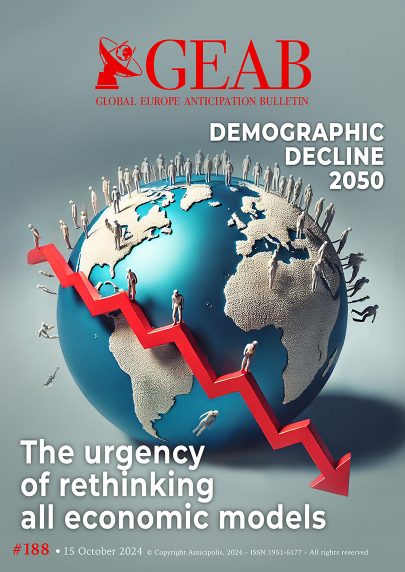GEAB 188

Population decline threatens to become collapse. Whatever happens, it will lead to some form of economic decline. Our economic models, based on infinite growth, need to be reinvented.
Degrowth is not an ideology; it is a reality that is imposing itself on the world. Our team offers as proof the mother of all change: demography. The global population is likely to decline in the coming decades, after having experienced only growth—except during external shocks (pandemics or world wars)—throughout the history of humanity[1].
The prospect of “surviving beyond 2050” is therefore not as provocative and metaphorical as it may sound at first. After being totally ignored and then underestimated[2], the decline in the world’s population is now undeniable and therefore widely accepted. However, our team believes that if its consequences are poorly managed, and if poor management choices lead to a worsening of the problems they are intended to solve, this decline could rapidly turn into a collapse.
We are among those who see demographic growth as the primary driver of economic growth, meaning that all economic models around the world will have to be reinvented. While degrowth as an ideological banner has little chance of winning over the masses, the fact remains that we must collectively turn the page on growth. Any solutions aimed at circumventing population decline by recreating exported, delocalised or dematerialised growth models will come up against other planetary limits.
Login

This issue reminds everyone (readers and writers alike) of the extent of the statistical fog currently defining our times. In choosing demography this month, you may say that we focused [...]
Changes in the attractiveness of different regions and in their attitudes to accepting foreign populations will naturally lead to a reorganisation of migratory flows. In this major rebalancing, the EU [...]
The birth rate has always been very high in religious, traditionalist and conservative communities. To anticipate what our future generations will be dreaming of, it is vital to ask which [...]
In 2048, Israel, far from celebrating its centenary, may no longer exist in its current form. The challenge does not come from its external enemies, but from demographic challenges, internal [...]
Last month our team published its calendar of future global geopolitical events up to January 2025. The calendar was so full that we were unable to mention the economic, monetary [...]
Lithium concentration continues Last week, Rio Tinto, an Anglo-Australian major in the lithium sector, confirmed the purchase of Arcadium Lithium, which owns the main lithium mine in Argentina, one of [...]



Comments